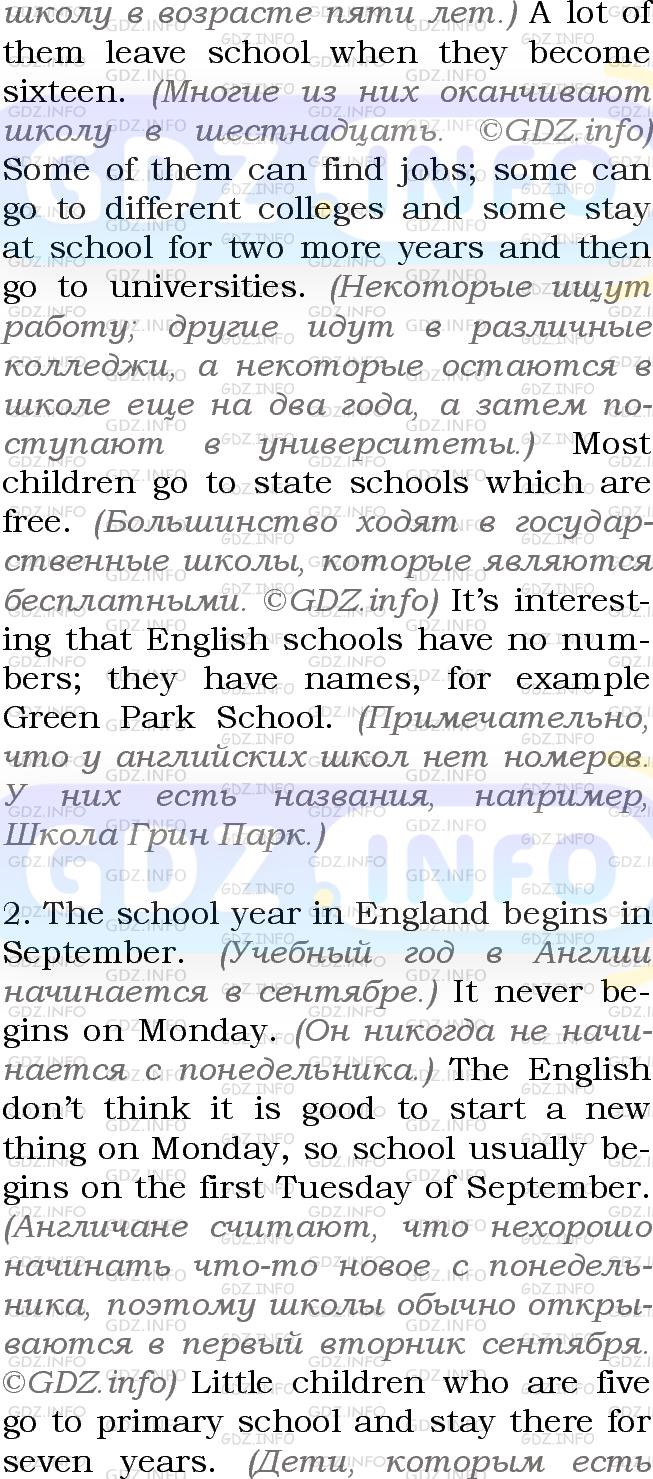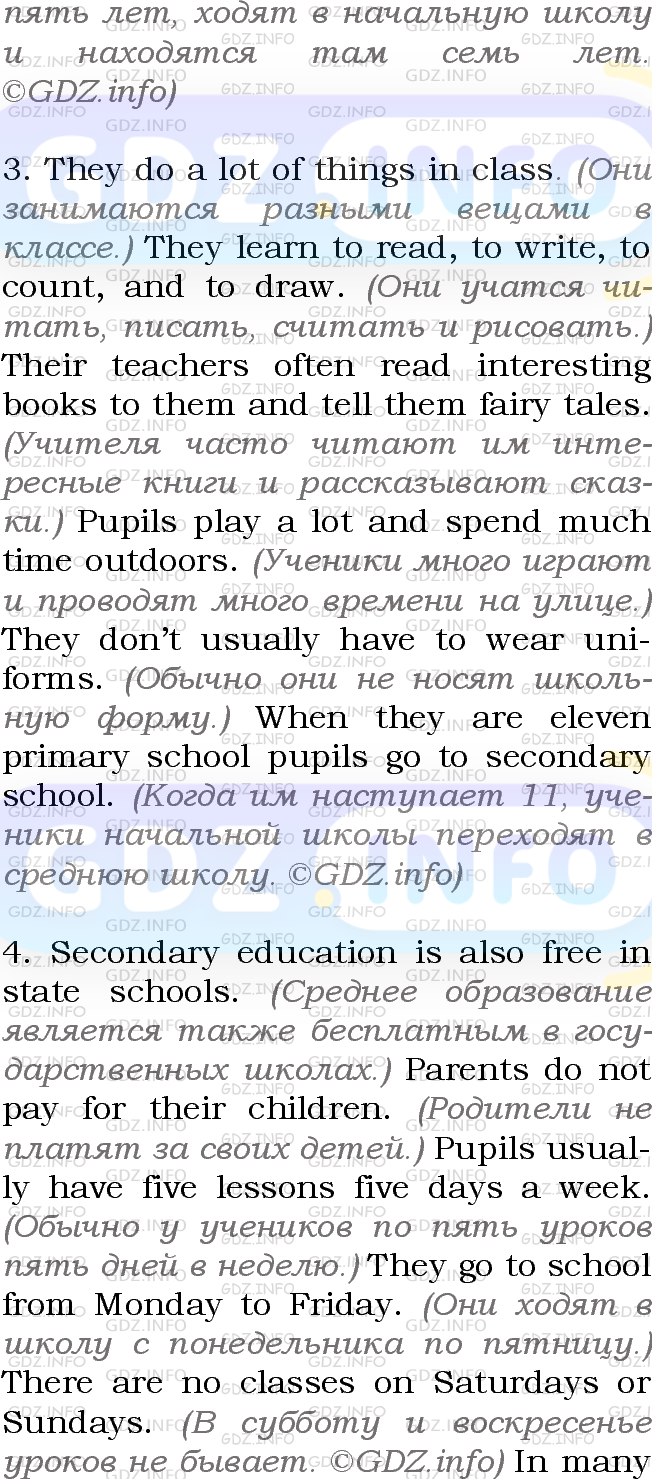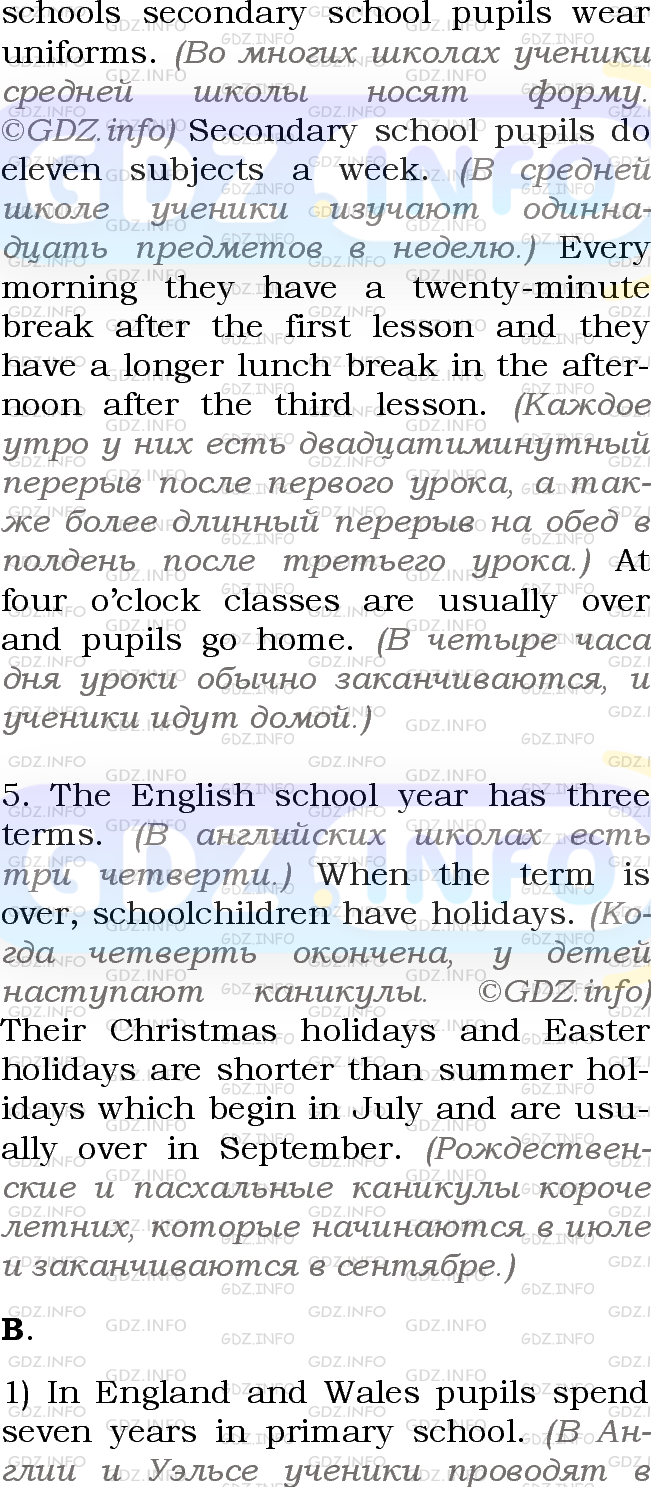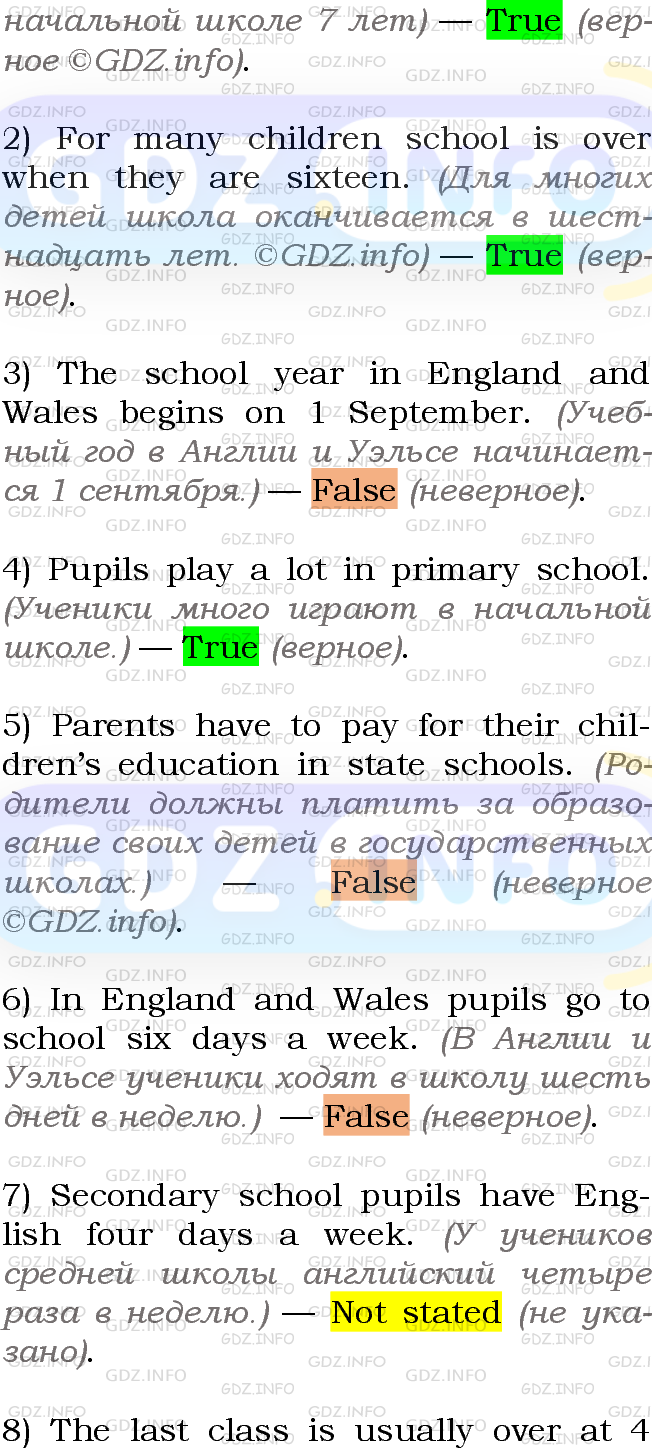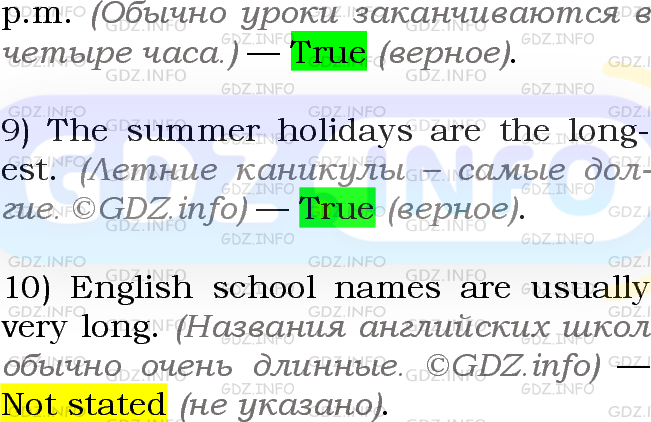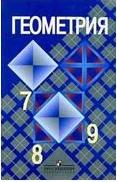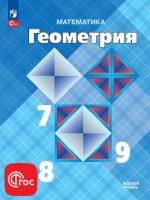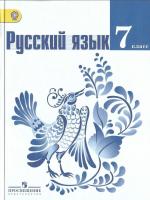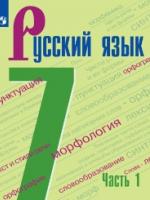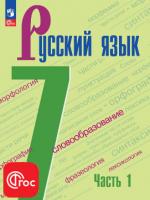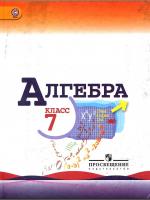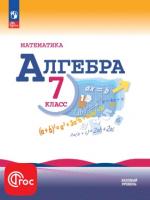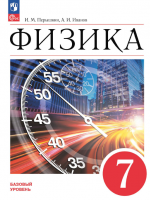Ответ на UNIT 1, Step 4, Номер 7 из ГДЗ по Английскому языку 7 класс: Афанасьева (Учебник Rainbow)
ГДЗ (готовое домашние задание из решебника) по Английскому языку 7 класса авторов О.В. Афанасьева, И.В. Михеева, К.М. Баранова 2014-2021г. на UNIT 1, Step 4, Номер 7. Schools and schooling.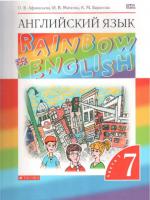
2014
Условие
A. Read the text and give names to its parts.
Schools in England and Wales
1. In England and Wales children start schooling when they are five. A lot of them leave school when they become sixteen. Some of them can find jobs; some can go to different colleges and some stay at school for two more years and then go to universities. Most children go to state schools which are free. It’s interesting that English schools have no numbers; they have names, for example Green Park School.
2. The school year in England begins in September. It never begins on Monday. The English don’t think it is good to start a new thing on Monday, so school usually begins on the first Tuesday of September. Little children who are five go to primary school and stay there for seven years.
3. They do a lot of things in class. They learn to read, to write, to count, and to draw. Their teachers often read interesting books to them and tell them fairy tales. Pupils play a lot and spend much time out−doors. They don’t usually have to wear uniforms. When they are twelve, primary school pupils go to secondary school.
4. Secondary education is also free in state schools. Parents do not pay for their children. Pupils usually have five lessons a day five days a week. They go to school from Monday to Friday. There are no classes on Saturdays or Sundays. In many schools secondary school pupils wear uniforms.
Secondary school pupils do eleven subjects a week. Every morning they have a twenty minute break after the first lesson and they have a longer lunch break in the afternoon after the third lesson. At four o’clock classes are usually over and pupils go home.
5. The English school year has three terms. When the term is over, schoolchildren have holidays. Their Christmas holidays and Easter holidays are shorter than summer holidays which begin in July and are usually over in September.
B. Which of these facts are true, false or not stated in the text?
1) In England and Wales pupils spend seven years in primary school.
2) For many children school is over when they are sixteen.
3) The school year in England and Wales begins on 1 September.
4) Pupils play a lot in primary school.
5) Parents have to pay for their children’s education in state schools.
6) In England and Wales pupils go to school six days a week.
7) Secondary school pupils have English four days a week.
8) The last class is usually over at 4 p.m.
9) The summer holidays are the longest.
10) English school names are usually very long.
Schools in England and Wales
1. In England and Wales children start schooling when they are five. A lot of them leave school when they become sixteen. Some of them can find jobs; some can go to different colleges and some stay at school for two more years and then go to universities. Most children go to state schools which are free. It’s interesting that English schools have no numbers; they have names, for example Green Park School.
2. The school year in England begins in September. It never begins on Monday. The English don’t think it is good to start a new thing on Monday, so school usually begins on the first Tuesday of September. Little children who are five go to primary school and stay there for seven years.
3. They do a lot of things in class. They learn to read, to write, to count, and to draw. Their teachers often read interesting books to them and tell them fairy tales. Pupils play a lot and spend much time out−doors. They don’t usually have to wear uniforms. When they are twelve, primary school pupils go to secondary school.
4. Secondary education is also free in state schools. Parents do not pay for their children. Pupils usually have five lessons a day five days a week. They go to school from Monday to Friday. There are no classes on Saturdays or Sundays. In many schools secondary school pupils wear uniforms.
Secondary school pupils do eleven subjects a week. Every morning they have a twenty minute break after the first lesson and they have a longer lunch break in the afternoon after the third lesson. At four o’clock classes are usually over and pupils go home.
5. The English school year has three terms. When the term is over, schoolchildren have holidays. Their Christmas holidays and Easter holidays are shorter than summer holidays which begin in July and are usually over in September.
B. Which of these facts are true, false or not stated in the text?
1) In England and Wales pupils spend seven years in primary school.
2) For many children school is over when they are sixteen.
3) The school year in England and Wales begins on 1 September.
4) Pupils play a lot in primary school.
5) Parents have to pay for their children’s education in state schools.
6) In England and Wales pupils go to school six days a week.
7) Secondary school pupils have English four days a week.
8) The last class is usually over at 4 p.m.
9) The summer holidays are the longest.
10) English school names are usually very long.
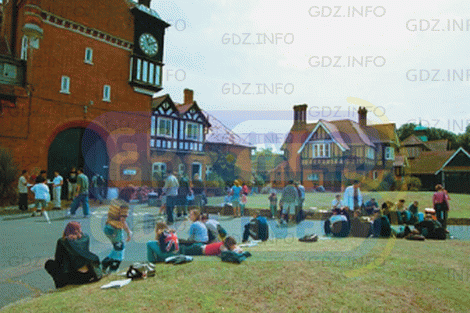
Решение №1
Подробное решение
- Белый фонпереписывать в тетрадь
- Цветной фонтеория и пояснения
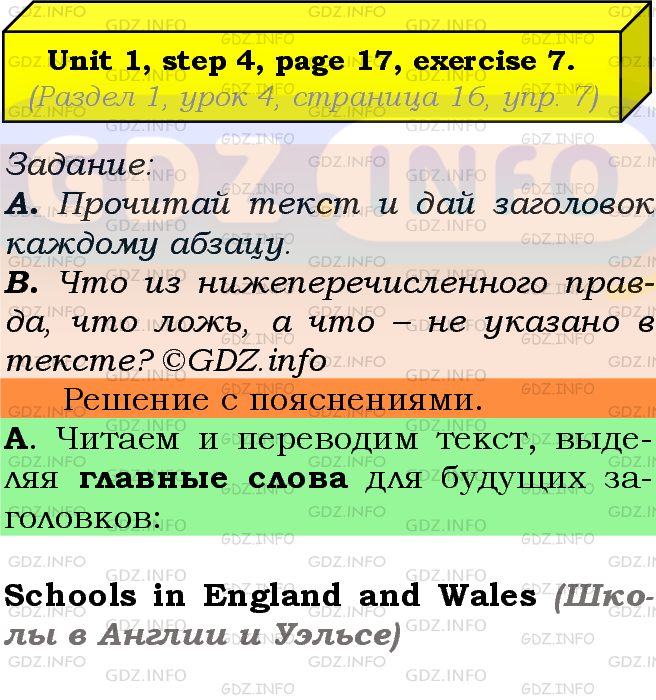
ОТКРЫТЬ РЕШЕНИЕ


